-
 Bitcoin
Bitcoin $115100
1.27% -
 Ethereum
Ethereum $3675
2.71% -
 XRP
XRP $2.995
1.45% -
 Tether USDt
Tether USDt $1.000
0.02% -
 BNB
BNB $769.8
2.64% -
 Solana
Solana $168.0
3.25% -
 USDC
USDC $0.9999
-0.01% -
 TRON
TRON $0.3371
1.48% -
 Dogecoin
Dogecoin $0.2051
3.36% -
 Cardano
Cardano $0.7394
2.30% -
 Hyperliquid
Hyperliquid $38.15
0.42% -
 Stellar
Stellar $0.3966
-0.36% -
 Sui
Sui $3.486
2.93% -
 Chainlink
Chainlink $16.72
2.52% -
 Bitcoin Cash
Bitcoin Cash $568.0
4.36% -
 Hedera
Hedera $0.2440
2.59% -
 Ethena USDe
Ethena USDe $1.001
0.04% -
 Avalanche
Avalanche $22.16
2.06% -
 Litecoin
Litecoin $119.1
-0.73% -
 UNUS SED LEO
UNUS SED LEO $8.991
0.04% -
 Toncoin
Toncoin $3.232
-0.39% -
 Shiba Inu
Shiba Inu $0.00001233
2.82% -
 Uniswap
Uniswap $9.717
2.53% -
 Polkadot
Polkadot $3.664
1.85% -
 Dai
Dai $1.000
0.01% -
 Monero
Monero $281.2
-3.89% -
 Bitget Token
Bitget Token $4.350
1.55% -
 Cronos
Cronos $0.1428
5.07% -
 Pepe
Pepe $0.00001050
3.68% -
 Aave
Aave $262.3
3.54%
How can Chinese investors participate in Bitcoin ETF trading?
Chinese investors face hurdles with Bitcoin ETFs due to regulations, but can use indirect methods like overseas brokerages or VPNs, though these carry risks and complexities.
Mar 28, 2025 at 10:57 pm
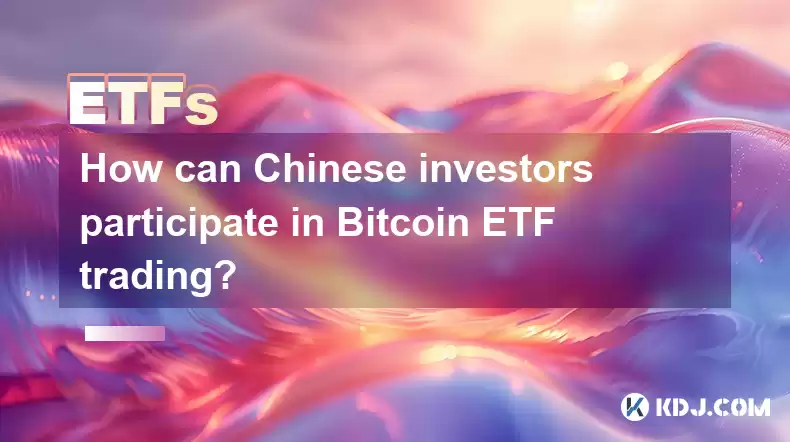
Understanding the Challenges for Chinese Bitcoin ETF Investors
Chinese investors face unique hurdles when attempting to participate in Bitcoin ETF trading. Direct investment in Bitcoin ETFs listed on exchanges like the NYSE or Nasdaq is generally not straightforward due to capital controls and regulatory restrictions within China. These restrictions aim to manage capital outflow and maintain control over the domestic financial system. Therefore, navigating these limitations requires careful consideration of alternative approaches.
Indirect Investment Methods: Exploring the Options
While direct access to Bitcoin ETFs might be restricted, several indirect methods allow Chinese investors to gain exposure to Bitcoin's price movements. These methods carry varying degrees of risk and complexity.
Utilizing Overseas Brokerage Accounts: Opening an account with a reputable international brokerage firm that allows trading in US-listed ETFs is one approach. This requires navigating international regulations and potentially dealing with currency exchange complexities. Thorough due diligence on the brokerage and understanding associated fees is crucial.
Investing Through Virtual Private Networks (VPNs): Some investors attempt to circumvent geographical restrictions using VPNs to access international exchanges. However, this method is risky, as it may violate Chinese regulations and could lead to account suspension or legal consequences. It's crucial to understand the legal ramifications before pursuing this option.
Employing Third-Party Platforms: Some platforms facilitate overseas investments, potentially offering access to Bitcoin ETFs. Caution is paramount when choosing such platforms; verify their legitimacy and security rigorously before entrusting funds. Scrutinize their fees and track record carefully.
Investing in Companies with Bitcoin Exposure: Instead of directly investing in Bitcoin ETFs, consider companies holding significant Bitcoin reserves or those actively involved in the Bitcoin ecosystem. This indirect approach offers exposure to Bitcoin's price movements through a publicly traded entity. However, this strategy dilutes direct Bitcoin exposure and is subject to the overall performance of the company.
Grayscale Bitcoin Trust (GBTC): While not an ETF, GBTC is a publicly traded trust that holds Bitcoin. It offers a degree of liquidity but often trades at a premium or discount to the net asset value (NAV) of its underlying Bitcoin holdings. Understanding the premium/discount dynamics is vital for successful investment.
Navigating Regulatory Landscape and Risks
The regulatory environment surrounding cryptocurrency in China is constantly evolving and can be unpredictable. Staying informed about the latest regulations is critical for any investor considering indirect exposure to Bitcoin ETFs. Changes in policy could significantly impact the viability of chosen investment strategies.
Furthermore, the inherent volatility of Bitcoin presents significant risk. Bitcoin's price can fluctuate dramatically in short periods, leading to substantial gains or losses. Investors should only allocate capital they can afford to lose and should thoroughly understand the risks involved before investing. Diversification across other asset classes is also recommended to mitigate risk.
Understanding the Differences Between Bitcoin and Bitcoin ETFs
It's crucial to understand the difference between directly holding Bitcoin and investing in a Bitcoin ETF. A Bitcoin ETF invests in Bitcoin, but it does so through a regulated fund structure. This means investors gain exposure to Bitcoin without the need to manage the cryptocurrency directly. However, ETFs are subject to management fees and other expenses, which directly impact returns.
Tax Implications for Chinese Investors
Tax implications for Chinese investors participating in overseas investments, including Bitcoin ETFs, can be complex. Seeking professional tax advice is essential to understand the tax liabilities associated with these investments. Failure to comply with tax regulations could lead to significant penalties.
Frequently Asked Questions
Q: Are there any Bitcoin ETFs available directly to Chinese investors within China?
A: Currently, there are no Bitcoin ETFs directly available to Chinese investors within China due to regulatory restrictions.
Q: What are the risks associated with using VPNs to access international exchanges?
A: Using VPNs to access international exchanges to trade Bitcoin ETFs is risky and may violate Chinese regulations. This could result in account suspension or legal repercussions.
Q: How can I find a reputable international brokerage firm?
A: Research thoroughly, checking reviews and regulatory licenses. Look for firms with a strong track record and robust security measures.
Q: What are the fees associated with investing in Bitcoin ETFs through international brokerages?
A: Fees vary depending on the brokerage and ETF. Expect trading fees, custody fees, and potentially currency conversion fees.
Q: Is investing in companies with Bitcoin exposure a safer alternative to directly investing in Bitcoin ETFs?
A: While potentially less volatile, this approach still carries market risk tied to the company's performance, not just Bitcoin's price. It also offers indirect exposure to Bitcoin.
Q: What are the tax implications of investing in Bitcoin ETFs for Chinese residents?
A: Tax implications are complex and depend on various factors. Consult a qualified tax professional for personalized advice. This is crucial to avoid potential penalties.
Q: What is the difference between holding Bitcoin directly and investing in a Bitcoin ETF?
A: Holding Bitcoin directly involves managing the cryptocurrency yourself, while a Bitcoin ETF provides regulated exposure to Bitcoin's price movements without the need for direct management.
Q: Are there any other ways to gain exposure to Bitcoin besides ETFs?
A: Yes, other options include investing in Bitcoin mining companies, Bitcoin-related businesses, or through derivatives markets (though these carry additional risks).
Disclaimer:info@kdj.com
The information provided is not trading advice. kdj.com does not assume any responsibility for any investments made based on the information provided in this article. Cryptocurrencies are highly volatile and it is highly recommended that you invest with caution after thorough research!
If you believe that the content used on this website infringes your copyright, please contact us immediately (info@kdj.com) and we will delete it promptly.
- BlockDAG, Litecoin, and Cardano: Charting the Course in Crypto's Dynamic Waters
- 2025-08-07 09:09:06
- Fireverse Token: Igniting a Musical Revolution in Web3
- 2025-08-07 08:27:45
- Ethereum, L2 Withdrawals, and Decentralization: A New Yorker's Take
- 2025-08-07 08:32:33
- Avalanche vs. Ruvi AI: Daily Sales Tell a Story of Crypto Disruption
- 2025-08-07 06:29:35
- DeSoc: The Crypto to Buy Now for a Decentralized Future (and Maybe 43x Gains!)
- 2025-08-07 06:50:16
- Arctic Pablo Coin: Riding the Meme Coin Wave with a Deflationary Twist
- 2025-08-07 07:18:13
Related knowledge
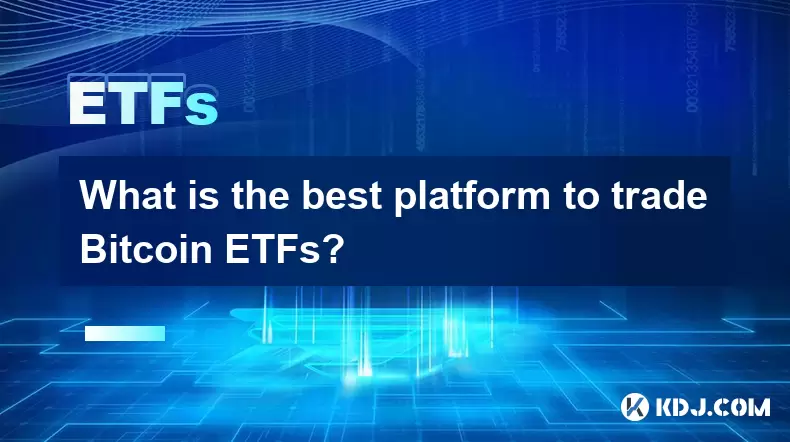
What is the best platform to trade Bitcoin ETFs?
Jul 23,2025 at 04:14am
Understanding Bitcoin ETFs and Their Role in TradingBitcoin Exchange-Traded Funds (ETFs) have gained significant traction among traditional and crypto...
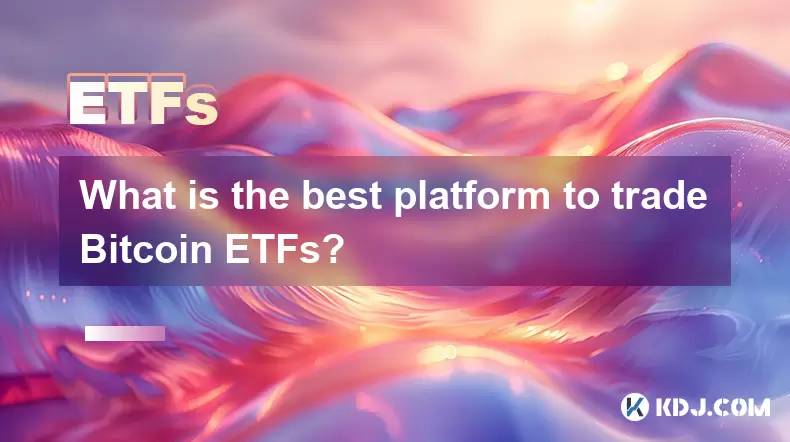
What is the best platform to trade Bitcoin ETFs?
Jul 17,2025 at 03:50pm
Understanding Bitcoin ETFs and Their Role in the MarketBitcoin Exchange-Traded Funds (ETFs) are investment vehicles that track the price of Bitcoin wi...
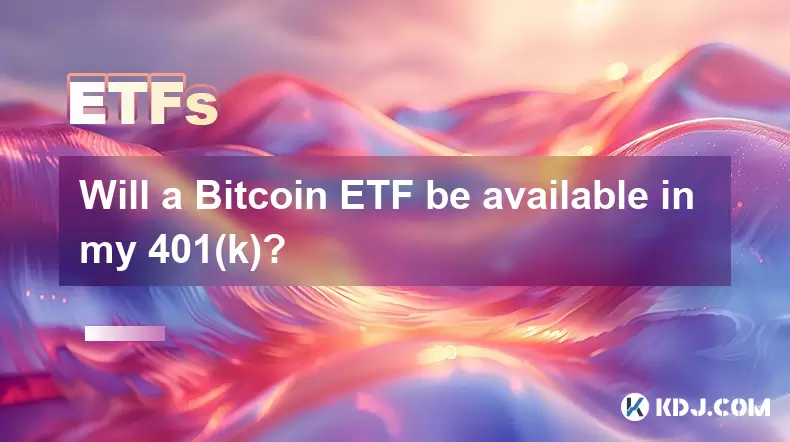
Will a Bitcoin ETF be available in my 401(k)?
Jul 17,2025 at 10:42pm
What is a Bitcoin ETF?A Bitcoin ETF (Exchange-Traded Fund) is an investment vehicle that tracks the price of Bitcoin without requiring investors to di...
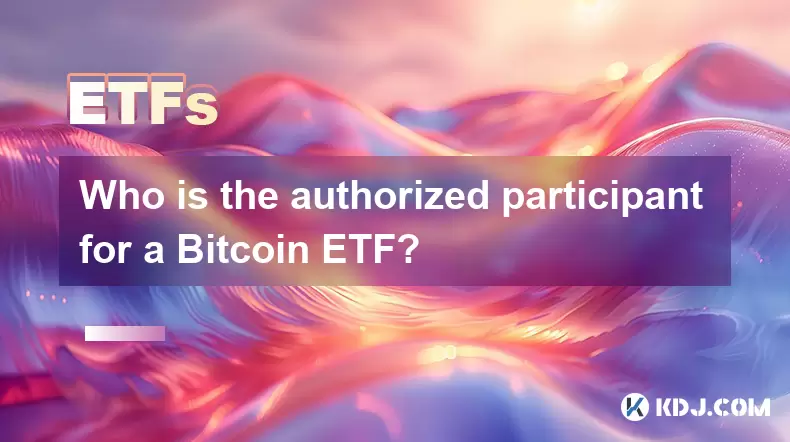
Who is the authorized participant for a Bitcoin ETF?
Jul 18,2025 at 12:42am
Understanding the Role of Authorized Participants in Bitcoin ETFsIn the context of Bitcoin Exchange-Traded Funds (ETFs), an authorized participant (AP...
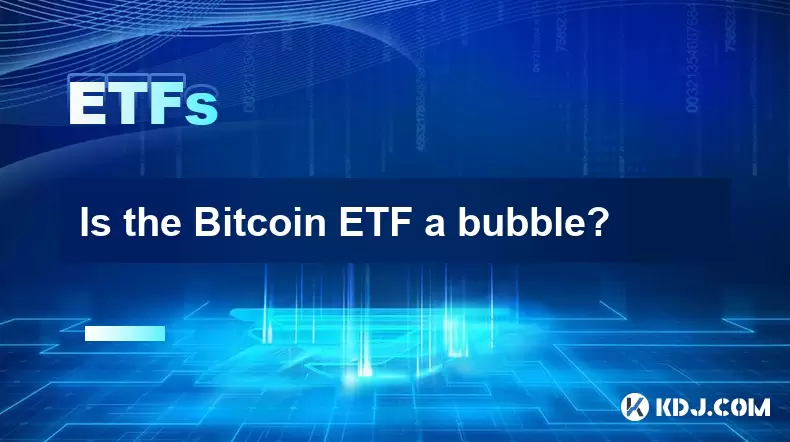
Is the Bitcoin ETF a bubble?
Jul 20,2025 at 06:57am
Understanding the Bitcoin ETF ConceptA Bitcoin Exchange-Traded Fund (ETF) is a financial product that aims to track the price of Bitcoin without requi...
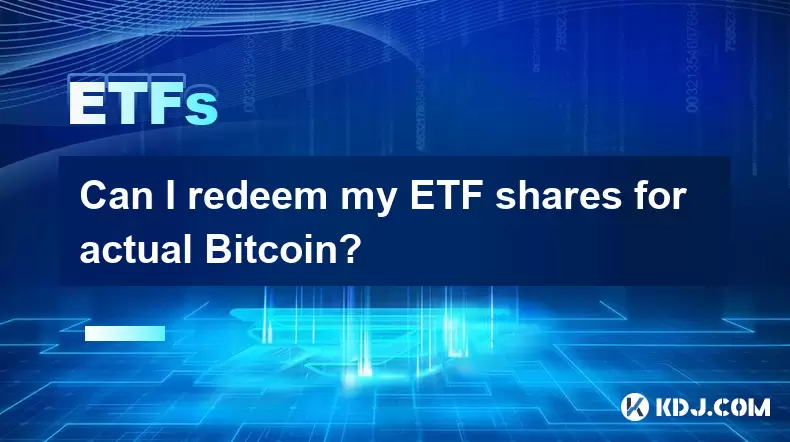
Can I redeem my ETF shares for actual Bitcoin?
Jul 17,2025 at 03:14pm
Understanding ETF Shares and Their Relation to BitcoinExchange-Traded Funds (ETFs) have become a popular investment vehicle for those looking to gain ...

What is the best platform to trade Bitcoin ETFs?
Jul 23,2025 at 04:14am
Understanding Bitcoin ETFs and Their Role in TradingBitcoin Exchange-Traded Funds (ETFs) have gained significant traction among traditional and crypto...

What is the best platform to trade Bitcoin ETFs?
Jul 17,2025 at 03:50pm
Understanding Bitcoin ETFs and Their Role in the MarketBitcoin Exchange-Traded Funds (ETFs) are investment vehicles that track the price of Bitcoin wi...

Will a Bitcoin ETF be available in my 401(k)?
Jul 17,2025 at 10:42pm
What is a Bitcoin ETF?A Bitcoin ETF (Exchange-Traded Fund) is an investment vehicle that tracks the price of Bitcoin without requiring investors to di...

Who is the authorized participant for a Bitcoin ETF?
Jul 18,2025 at 12:42am
Understanding the Role of Authorized Participants in Bitcoin ETFsIn the context of Bitcoin Exchange-Traded Funds (ETFs), an authorized participant (AP...

Is the Bitcoin ETF a bubble?
Jul 20,2025 at 06:57am
Understanding the Bitcoin ETF ConceptA Bitcoin Exchange-Traded Fund (ETF) is a financial product that aims to track the price of Bitcoin without requi...

Can I redeem my ETF shares for actual Bitcoin?
Jul 17,2025 at 03:14pm
Understanding ETF Shares and Their Relation to BitcoinExchange-Traded Funds (ETFs) have become a popular investment vehicle for those looking to gain ...
See all articles

























































































